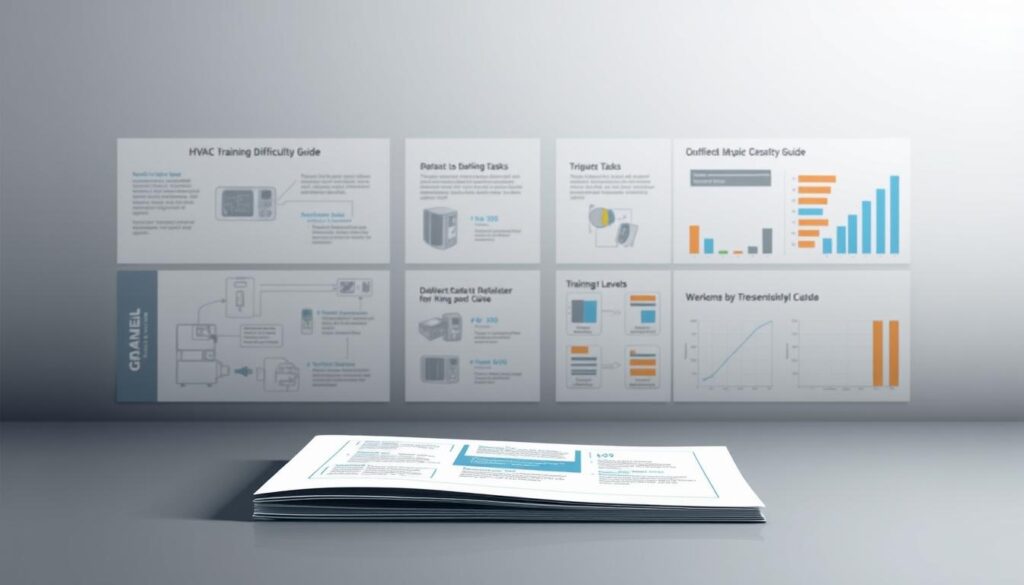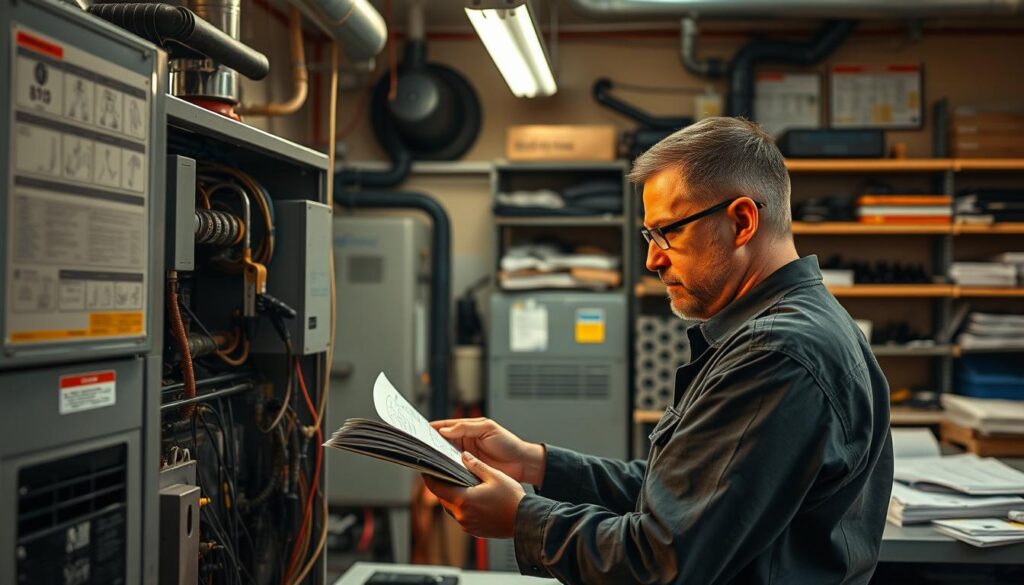Affiliate Disclosure
HVAC Guide Guys is a participant in the Amazon Services LLC Associates Program, an affiliate advertising program designed to provide a means for sites to earn advertising fees by advertising and linking to Amazon.
How Hard is HVAC To Learn? Are you thinking about a career in HVAC? You might be surprised at how challenging HVAC training can be.

HVAC training is a demanding but rewarding technical field. It requires dedication and a strategic approach to learning. With hard work, you can develop the skills needed to thrive in this industry.
The need for skilled HVAC technicians is growing fast. By 2033, there will be 40,100 new job openings. This makes HVAC a promising career for those who are eager to learn and work hard.
Key Takeaways
- HVAC training requires commitment and technical aptitude
- 100% of aspiring technicians start with a high school diploma
- Hands-on training is key for skill development
- Certification boosts your job chances and pay
- Career opportunities in HVAC are expanding quickly
Table of Contents
Understanding the Basics of HVAC Systems
HVAC systems keep our homes and buildings comfortable. They control temperature, humidity, and air quality. Knowing how they work is key to being good at HVAC.
Key Components of HVAC Systems
- Heating units (furnaces)
- Cooling units (air conditioners)
- Ventilation systems (ductwork)
- Thermostats and control systems
Fundamental Operating Principles
HVAC systems use heat transfer and air flow. Your studies will teach you about:
- Keeping indoor temperatures right
- Managing humidity
- Filtering and moving air
| System Type | Energy Efficiency | Average Lifespan |
|---|---|---|
| Central Air Conditioning | 13-16 SEER Rating | 15-20 Years |
| Heat Pump Systems | 14-18 SEER Rating | 10-15 Years |
| Ductless Mini-Split | 16-22 SEER Rating | 12-15 Years |
Role of Modern Technology in HVAC
Today’s HVAC systems use smart technologies to work better. Smart thermostats can cut energy use by 10-15%. This shows how new tech is changing HVAC.
“Understanding HVAC systems is the first step to mastering this dynamic and essential field.” – HVAC Professional
Learning these basics will help you grow in HVAC. It’s a great start to your HVAC journey.
How Hard is HVAC to Learn: Breaking Down the Learning Curve
Learning HVAC is more than just technical skills. It’s a journey that tests your mind and body. The difficulty of HVAC training depends on your skills, effort, and how you learn. Some find it easy, while others face bigger challenges.
To understand how hard HVAC is to learn, we need to look at different parts of the training:
- Technical complexity of systems
- Physical demands of the job
- Continuous technological advancements
- Problem-solving skills required
“HVAC is not just a job, it’s a skill that combines technical knowledge with practical application.” – Industry Expert
Mastering HVAC involves learning many technical areas. You’ll need to grasp electrical systems, refrigeration, airflow, and mechanical interactions. With proper training, these skills get easier over time.
| Training Aspect | Difficulty Level | Time Investment |
|---|---|---|
| Basic Electrical Systems | Moderate | 3-6 months |
| Refrigeration Principles | Complex | 6-12 months |
| Advanced Troubleshooting | Advanced | 1-2 years |
Physical demands are a big part of HVAC training. You’ll need strength for carrying tools, working in tight spaces, and installing systems. The job also requires good physical shape and endurance, which can be tough for some.
Success in HVAC comes from a commitment to keep learning. With over 650,000 HVAC professionals in the U.S. and a 5% annual growth, there are many chances for those who are dedicated to learning HVAC’s details.
Explore Our HVAC Shop
Looking for top-rated HVAC tools, parts, and accessories? Visit our shop and find the perfect solution for your needs.
Visit the ShopEducational Requirements and Prerequisites
Starting a career in HVAC needs a solid educational base. You must prepare well and meet certain academic standards.
High School Diploma Essentials
A high school diploma or GED is the first step for HVAC techs. The U.S. Bureau of Labor Statistics says it’s the minimum needed for HVAC training. Your high school education is key for more advanced learning.
Critical Math and Science Skills
For HVAC certification, you need good math and science skills. You should be able to:
- Do basic math
- Understand fractions and decimals
- Know basic algebra
- Get physics basics
- Apply mechanical reasoning
Technical Background Advantages
Having a technical background helps a lot. It lets you learn HVAC faster. Students who already know about mechanical systems do better in training.
“Technical preparation transforms into professional HVAC skills.” – Industry Expert
| Educational Requirement | Skill Level | Career Impact |
|---|---|---|
| High School Diploma | Minimum Entry | Program Qualification |
| Mathematics Skills | Intermediate | Technical Competence |
| Technical Background | Advanced | Faster Career Progression |
How well you prepare for school will shape your HVAC career. Learning is your main way to become a skilled HVAC pro.
Two Main Paths to Becoming an HVAC Technician
Exploring hvac career prospects reveals two main paths to becoming an HVAC technician. Each path has its own benefits and challenges. They cater to different needs in the HVAC job market demand.
Path 1: On-the-Job Training
The first way is to get a job and learn by doing. This method lets you:
- Earn while you learn
- Gain practical experience right away
- Make professional connections
- Quickly develop real-world skills
Path 2: Formal Educational Programs
The second path involves formal HVAC technician training. These programs last from 6 to 12 months. They offer a detailed education.
- A structured curriculum on technical skills
- Training in classrooms and labs
- Professional certifications
- Deeper understanding of complex HVAC systems
“Over 60% of employers in the HVACR industry prefer candidates with formal training due to technological complexity.” – Industry Research
Both paths lead to valuable opportunities in the HVAC industry. Your choice depends on your learning style, time, and career goals. The key is selecting the route that best matches your individual circumstances and professional aspirations.
Explore Our HVAC Shop
Looking for top-rated HVAC tools, parts, and accessories? Visit our shop and find the perfect solution for your needs.
Visit the ShopDuration of HVAC Training Programs
Thinking about a career in HVAC? It’s important to know how long it takes. The time needed varies based on your chosen path. You could go from quick certificate programs to longer apprenticeships.
There are different ways to become an HVAC technician. You can choose from:
- Certificate programs
- Associate degree programs
- Apprenticeship programs
Certificate Program Timeline
Certificate programs are the quickest way to start. They last from 6 to 12 months. This makes them great for those who want to get into HVAC quickly.
Apprenticeship Length
Apprenticeships offer a deep dive into HVAC training. They last 3-5 years. You’ll learn in class and get real-world experience. Plus, you earn money while you learn.
| Program Type | Duration | Key Features |
|---|---|---|
| Certificate Program | 6-12 months | Fastest entry path |
| Associate Degree | 2 years | Comprehensive theoretical training |
| Apprenticeship | 3-5 years | Paid on-the-job training |
Continuing Education Requirements
HVAC pros need to keep up with new tech. Continuing education is key. You’ll need to renew certifications like EPA Section 608 and stay updated.
“The HVAC field is dynamic – your learning never truly stops.” – Industry Expert
Staying committed to learning is key to success in HVAC.
Core Skills Required for HVAC Success

Mastering HVAC technical skills is key for a successful HVAC career. You need to mix technical know-how with soft skills. This blend is essential for success.
To become a top HVAC technician, you must master several areas:
- Technical Proficiency in HVAC Systems
- Electrical Circuit Understanding
- Blueprint Reading
- Problem-Solving Abilities
- Customer Service Excellence
“Success in HVAC is 30% technical knowledge and 70% practical application” – Industry Expert
The best HVAC technicians have both technical and soft skills. Studies show that 75% of contractors value problem-solving skills. Also, 85% say customer service is key to a good reputation.
| Skill Category | Key Competencies | Industry Importance |
|---|---|---|
| Technical Skills | Electrical wiring, pipe welding, leak testing | 75% critical for job performance |
| Safety Skills | OSHA protocols, protective equipment usage | 40% reduction in workplace accidents |
| Soft Skills | Communication, time management | 90% impact on customer satisfaction |
Continuous learning is vital in HVAC. About 70% of HVAC companies support ongoing education. This helps technicians stay current with new tech and standards.
Building these skills takes hard work, practical training, and a drive for growth. Your success hinges on combining technical skills with adaptability and a focus on customer service.
Explore Our HVAC Shop
Looking for top-rated HVAC tools, parts, and accessories? Visit our shop and find the perfect solution for your needs.
Visit the ShopHands-On Training Components
HVAC hands-on training is key to moving from classroom to real-world skills. It’s your path to becoming a skilled HVAC technician. You’ll learn by doing, turning book knowledge into real-world skills.
Practical training is where your learning really comes alive. It’s like a real job, but you’re learning. You’ll face the challenges of HVAC work head-on.
Laboratory Practice Sessions
In labs, you’ll learn by doing. You’ll get hands-on with:
- Electrical system diagnostics
- Refrigerant handling
- Troubleshooting HVAC systems
- Understanding equipment performance
Field Training Experience
Field training takes you out of the classroom. You’ll work with pros, learning:
- How to install residential systems
- Commercial HVAC maintenance
- Safety and compliance
- How to talk to customers
Equipment Familiarization
Knowing your tools is essential. You’ll learn about:
| Tool Category | Essential Skills |
|---|---|
| Diagnostic Tools | Multimeter usage, pressure gauge reading |
| Installation Equipment | Pipe cutting, brazing, soldering techniques |
| Advanced Technologies | Smart thermostat programming, IoT integration |
“Hands-on training transforms knowledge into expertise, preparing you for a successful HVAC career.” – Industry Professional
With these training components, you’ll be ready for the HVAC industry. You’ll have the skills to tackle any challenge.
HVAC Certification Process and Requirements
Understanding HVAC certification requirements is key to your career. Knowing the specific certifications and technical skills needed makes you a top HVAC technician.
The certification process has several important parts. These show your skills in HVAC:
- EPA Refrigerant Certification
- State-specific licensing requirements
- Professional industry credentials
- Continuing education programs
Refrigerant certifications are vital for HVAC pros. The EPA offers three main types:
| Certification Type | Application |
|---|---|
| Type I | Small appliance servicing |
| Type II | High-pressure system servicing |
| Type III | Low-pressure system servicing |
The North American Technician Excellence (NATE) certification is a big deal. It’s the largest nonprofit for HVACR techs in the U.S. Employers love to see it on resumes.
“Certification is not just a piece of paper, it’s proof of your commitment to professional excellence.” – HVAC Industry Expert
Most states need technicians to get formal training, pass exams, and keep learning. Training lasts from 9 months to 2 years, depending on your path.
Explore Our HVAC Shop
Looking for top-rated HVAC tools, parts, and accessories? Visit our shop and find the perfect solution for your needs.
Visit the ShopCommon Challenges in Learning HVAC
Learning HVAC is tough. It tests your skills and determination. You need to know a lot, be physically strong, and solve problems well.

Starting your HVAC career comes with big challenges. These can affect your success in this tough field.
Technical Complexity Hurdles
HVAC training is very intense. You must understand many system types. You’ll learn:
- Electrical system diagnostics
- Blueprint reading techniques
- Complex refrigeration system operations
- Advanced wiring installation methods
Physical Demands of the Profession
HVAC technicians face tough physical tasks. It’s not just sitting at a desk. You’ll do:
- Lifting heavy equipment
- Working in cramped spaces
- Climbing ladders and navigating tight spaces
- Doing tasks in extreme temperatures
Time Management and Professional Skills
Good HVAC pros are organized. They manage their time well. This includes:
- Scheduling many service calls
- Keeping accurate repair records
- Combining classroom learning with hands-on training
- Staying in touch with clients
“The HVAC industry needs you to keep learning and be flexible. Success comes from mastering technical skills and being professional.” – Industry Expert
These challenges might seem hard, but they’re chances to grow. With hard work, the right training, and a drive to keep learning, you can beat these hurdles in your HVAC journey.
Career Prospects and Growth Opportunities
The HVAC job market is booming. As of 2023, there are about 441,200 HVAC technician jobs in the U.S. This shows great promise for those looking to start a career in this field.
Your future in HVAC looks very promising. The U.S. Bureau of Labor Statistics predicts a 9% job growth for HVAC technicians by 2033. This means lots of opportunities are coming your way.
“The HVAC industry offers stable and rewarding career paths for skilled professionals.” – Industry Expert
Salary and Compensation Insights
Working in HVAC can be very rewarding financially. In 2023, HVAC technicians make a median salary of $57,300 a year. The highest earners can make up to $80,820 annually.
Regional Opportunities
Some states have a higher demand for HVAC technicians. The top places for HVAC jobs are:
- California
- Florida
- Ohio
- Texas
- Illinois
Competitive Advantages
| Career Benefit | Details |
|---|---|
| Training Duration | 6-24 months |
| Median Annual Salary | $57,300 |
| Job Growth Projection | 9% by 2033 |
HVAC technicians are in high demand, unlike many jobs that might be automated. Your skills are essential for keeping and improving important systems. This ensures job security and opens up many opportunities for growth.
Invest in your HVAC training today and unlock a future of stable, rewarding career opportunities.
Explore Our HVAC Shop
Looking for top-rated HVAC tools, parts, and accessories? Visit our shop and find the perfect solution for your needs.
Visit the ShopEssential Tools and Resources for HVAC Learning
Starting a career in HVAC needs careful planning and the right tools. You must understand the key tools and learning materials for your journey. These will help you grow your technical skills.
At the beginning of your HVAC training, you’ll need to buy important equipment. HVAC technicians usually spend $200 to $500 on their first tool kit. Your kit should have several essential items:
- Basic hand tools (channel locks, pipe wrenches)
- Specialty HVAC measuring devices
- Digital multimeters
- Utility knives
- Magnetic tape measures
- Rechargeable flashlights
Learning HVAC requires both practical tools and educational resources. Invest in detailed training materials:
- Online HVAC training courses
- Technical textbooks
- Industry certification preparation guides
- Digital learning platforms
“Success in HVAC is about equipping yourself with knowledge and the right tools” – Industry Expert
The U.S. Bureau of Labor Statistics predicts a 4% job growth for HVAC professionals. This means over 15,000 new jobs will open up. By choosing the right learning resources and tools, you’ll be ready for a successful HVAC career.
Conclusion
Learning about HVAC might seem tough, but the rewards are worth it. The HVAC field is growing fast, with a 13% increase expected in the next decade. This means your training could open up many doors.
Starting HVAC technicians can make between $30,000 to $60,000 a year. This makes it a great choice for those looking for a good income.
HVAC careers are looking bright for those who keep learning and improving. The industry is growing at a 5% rate each year. Plus, 90% of HVAC techs find their job very fulfilling.
Your success in HVAC depends on experience, education, and staying up-to-date with new tech. With practice, you can pass certification exams and become a top technician. The best technicians see their job as a lifelong learning journey.
Whether you’re interested in homes, businesses, or factories, your future is bright. Think about what you’re good at, look for training, and start your journey. HVAC offers both financial security and personal fulfillment.
FAQ
How difficult is it to learn HVAC?
How long does it take to become a qualified HVAC technician?
What educational background do I need to start in HVAC?
Is HVAC a physically demanding career?
What certifications are required for HVAC technicians?
How much math is involved in HVAC training?
What are the biggest challenges in learning HVAC?
Is HVAC a good career choice for someone without prior technical experience?
What are the typical costs associated with HVAC training?
How difficult is it to learn HVAC?
How long does it take to become a qualified HVAC technician?
What educational background do I need to start in HVAC?
Is HVAC a physically demanding career?
What certifications are required for HVAC technicians?
How much math is involved in HVAC training?
What are the biggest challenges in learning HVAC?
Is HVAC a good career choice for someone without prior technical experience?
What are the typical costs associated with HVAC training?
FAQ
How difficult is it to learn HVAC?
Learning HVAC is moderately challenging. It needs technical knowledge, practical skills, and ongoing education. It’s not too hard, but it requires dedication and a strong math and science background.
How long does it take to become a qualified HVAC technician?
It usually takes 6 months to 2 years for initial training. This can be through a certificate program, associate degree, or apprenticeship. After that, technicians often get more certifications, taking 1-2 years.
What educational background do I need to start in HVAC?
You need a high school diploma or GED. Skills in math, physics, and mechanical reasoning are very helpful. Many HVAC technicians have a technical or vocational background.
Is HVAC a physically demanding career?
Yes, HVAC is physically demanding. Technicians lift heavy equipment, work in tight spaces, and climb ladders. You need to be physically fit and able to work in challenging conditions.
What certifications are required for HVAC technicians?
You need EPA Section 608 Certification for refrigerants. NATE (North American Technician Excellence) certification can also boost your career.
How much math is involved in HVAC training?
HVAC training requires a lot of math. You’ll learn algebra, geometry, and trigonometry. Math is used for calculating loads, measuring circuits, and understanding thermodynamics.
What are the biggest challenges in learning HVAC?
The biggest challenges are understanding complex systems, keeping up with technology, and developing technical skills. You also need to manage physical demands and keep learning.
Is HVAC a good career choice for someone without prior technical experience?
Absolutely! Many HVAC technicians start without experience. With dedication and proper training, you can learn the necessary skills. Apprenticeships are great for beginners.
What are the typical costs associated with HVAC training?
Training costs vary from
FAQ
How difficult is it to learn HVAC?
Learning HVAC is moderately challenging. It needs technical knowledge, practical skills, and ongoing education. It’s not too hard, but it requires dedication and a strong math and science background.
How long does it take to become a qualified HVAC technician?
It usually takes 6 months to 2 years for initial training. This can be through a certificate program, associate degree, or apprenticeship. After that, technicians often get more certifications, taking 1-2 years.
What educational background do I need to start in HVAC?
You need a high school diploma or GED. Skills in math, physics, and mechanical reasoning are very helpful. Many HVAC technicians have a technical or vocational background.
Is HVAC a physically demanding career?
Yes, HVAC is physically demanding. Technicians lift heavy equipment, work in tight spaces, and climb ladders. You need to be physically fit and able to work in challenging conditions.
What certifications are required for HVAC technicians?
You need EPA Section 608 Certification for refrigerants. NATE (North American Technician Excellence) certification can also boost your career.
How much math is involved in HVAC training?
HVAC training requires a lot of math. You’ll learn algebra, geometry, and trigonometry. Math is used for calculating loads, measuring circuits, and understanding thermodynamics.
What are the biggest challenges in learning HVAC?
The biggest challenges are understanding complex systems, keeping up with technology, and developing technical skills. You also need to manage physical demands and keep learning.
Is HVAC a good career choice for someone without prior technical experience?
Absolutely! Many HVAC technicians start without experience. With dedication and proper training, you can learn the necessary skills. Apprenticeships are great for beginners.
What are the typical costs associated with HVAC training?
Training costs vary from $1,200 for certificates to $30,000 for associate degrees. Community colleges and vocational schools are more affordable. Many employers offer on-the-job training and apprenticeships.
What is the job market like for HVAC technicians?
The HVAC job market is strong and growing. The U.S. Bureau of Labor Statistics predicts a 5% growth rate from 2020-2030. Technological advancements and energy efficiency drive demand.
,200 for certificates to ,000 for associate degrees. Community colleges and vocational schools are more affordable. Many employers offer on-the-job training and apprenticeships.
What is the job market like for HVAC technicians?
The HVAC job market is strong and growing. The U.S. Bureau of Labor Statistics predicts a 5% growth rate from 2020-2030. Technological advancements and energy efficiency drive demand.

